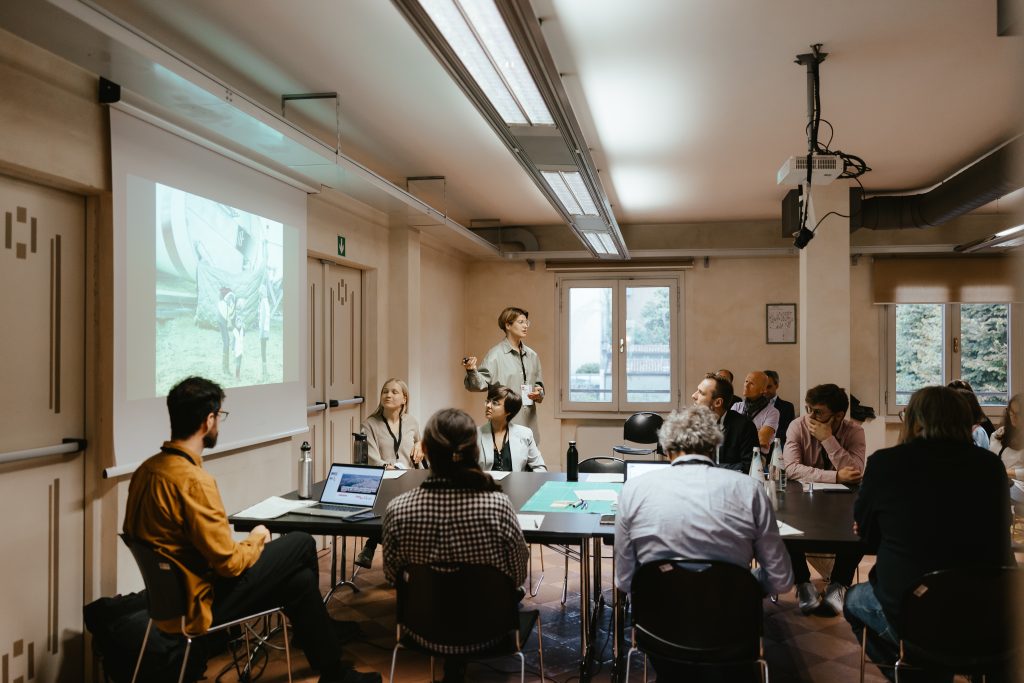Exploring Isaura: Unveiling the path to a fossil-free future
Isaura, Calvino's invisible city, provides a unique setting for cities to explore their transition from fossil fuels to renewables. In this fascinating journey, we dove into discussions and strategies that are reshaping our urban and district landscapes.
Isaura, a city imagined by Italo Calvino, is a place where the hidden secrets of an underground lake reveal how to disconnect cities from fossil fuels. The invisible landscape beneath the city’s surface is mirrored by its visible urban landscape. In this city, everything is powered by the hidden underground lake. Isaura serves as a metaphorical backdrop for modern cities seeking to free themselves from dependence on fossil fuels.
At our Annual Forum in Modena on October 18, members were taken on an inspirational journey to Isaura to explore opportunities for transitioning to renewable energy and decarbonizing cities.
Propagating renewal at the district scale

The key objective of this journey to Isaura was to learn how to effectively propagate renewable energies at district level and phase out natural gas in buildings by co-creating processes with stakeholders and gain insights from district experiences in European cities, regions, and organizations.
Allow us to delve into the Isaura South District, which aspires to transform into a positive energy district. The district intends to rely on 80% renewable energy sources, a 30% reduction in car trips, affordable and healthy housing, and nearly zero emissions. However, the current reality in Isaura paints a different picture, characterized by traffic challenges and a scarcity of green spaces.
The challenge is clear: How can Isaura, like many other cities, achieve their ambitious goals and move away from fossil fuels by propagating renewable energies at the district level? To have a holistic approach and a method, the participants of our Forum used the Cities4PEDs toolkit.
Local leaders shared their experiences of district renewal for positive energy. The insights offered by city representatives revolved around citizens’ involvement and the strategies needed to drive progress. Baptiste Mougeot from SPL Lyon-Confluence emphasized the importance of renewing districts through heightened coordination with local stakeholders and securing funding for energy community development. For some city representatives, the crucial focus lies in fostering energy communities, emphasizing the need for well-defined roles and open communication with citizens to involve them in the heart of the project.
The success of decarbonizing districts lies in the local context, the development of local skills, and the active engagement of citizens. The key considerations include achieving a balance between technical and social innovation, involving stakeholders and energy experts: the shared observation is that more efforts are usually dedicated to technical than social innovation.
How to phase out natural gas in buildings and plan the infrastructures of the future?
Throughout this journey to Isaura, another crucial question emerged: How can we phase out the use of natural gas in buildings and proactively design the infrastructure of the future? Topics such as the decarbonization of heat, the role of infrastructure, the need for green gases and whether citizens should be forced to change their heating systems were discussed.
City representatives shared diverse perspectives on this issue, highlighting the need to ban natural gas or not, the importance of communication and support, and the idea that a transition must be carefully planned to avoid leaving citizens vulnerable. Furthermore, eliminating all oil and gas before 2050 is a challenge, but with preparation and political support it can be achieved. Vienna, Winterthur and Munich, involved in the DecarbCityPipes 2050 project, underlined different outcomes of their heating and cooling strategies : green gases and hydrogen shouldn’t be used in buildings, and a ban of boilers in a timeframe of 10 to 15 years, like in Winterthur, would be key to foster a large decarbonisation movement supported by important subsidies. In addition, the obligation of Member States to provide support to local heating and cooling planning, as foresee in the recast Energy Efficiency Directive, is paramount in this transition.
Cities can look to this Isaura journey as a symbol of potential transformation, where renewable energy can replace dependance on fossil fuels, shaping a greener and more sustainable future for cities.

